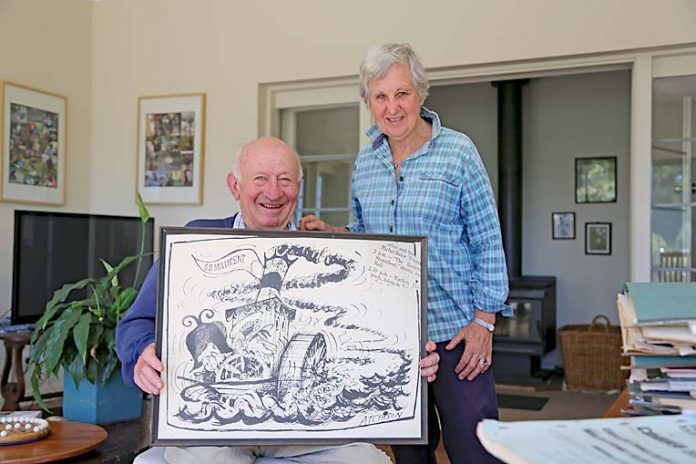

“EVERY vote counts.”
There is no one in Australian political history who knows the importance of this phrase better than former Senator and Legislative Council member Martin Cameron.
Exactly five decades ago tomorrow, the Thornlea father of four contested the safe Labor House of Assembly seat of Millicent for the Liberal and Country League (LCL).
And he lost by one vote.
“It changed the way my generation voted in the election,” Mr Cameron said.
“People realised the value of their vote and how important it was.”
On March 2, 1968, Mr Cameron took on incumbent Labor MP Des Corcoran after objecting to his views on road transport control.
“I was talking to Des about the controls and he agreed it was ridiculous, but he said that he would vote for it,” he said.
“I said ‘if that’s the case, why are you supporting it?’
“He said ‘you don’t understand how it works Martin, a majority of the party room will be voting for it, so I will be voting for it’.
“I said to him there’s only one place for you and that’s out of parliament.
“And he said the words which started my political career.
“It’ll take a better man than you to put me out.
“I felt the blood go up.
“Until then I had absolutely no interest in politics.”
The fate of the Government of South Australia hung on the outcome of the vote in the seat, with the Australian Labor Party and the Liberals deadlocked on 18-seats each in the then 39 seat parliament.
A victory at the election for Mr Cameron would ensure a working majority for the LCL Government, which was dependent on the whim of independent Tom Stott who occupied the speaker’s chair.
However, a win for Mr Corcoran would keep electoral reform alive and improve the state’s outmoded and unfair practice of making rural votes worth up to seven times as much as urban votes.
The electorate of Millicent, which extended from Robe to the north to Donovans in the south, was held by Labor’s Jim Corcoran from 1956 to 1962 and preceded by his son and later premier Des.
“Millicent was not necessarily a Labor electorate, it was Jim Corcoran and the Corcoran name that was winning,” Mr Cameron said.
“The fishing industry was in chaos because anyone could get a licence and I found there were an enormous amount of people on the Millicent electoral roll who didn’t live in the seat.
“Our campaign was very much on the ground, we did our own thing and ignored HQ for the most part.
“We had no idea it was going to turn out the way it did.”
The electorate hit the booths and, for the first time since the seat was formed, there was a possibility of Millicent being lost by Labor.
More than one week later, a 12-hour marathon in the Millicent counting room still left the outcome of the election in the air, with sitting member Des Corcoran gaining a lead of two votes.
Among the unusual informal votes received was one lodged in the Port MacDonnell box, which contained a “1” and a “2” in pencil on the reverse of the ballot paper, with the 1 placed in the square opposite Mr Corcoran.
While ALP scutineer Geoff Virgo MP argued for the admittance of the vote, the State Returning Officer sided with Liberal scrutineer, who claimed a vote which had to be read upside down and back to front on the reverse side was “clearly informal”.
On March 19, after swinging for two weeks, the final results were declared at 3634 for Mr Cameron and 3635 for Mr Corcoran.
“The last vote counted was one of my close relations and I’d assumed that she voted for me,” he said.
“When they opened her envelope, I lost by one vote.
“Another of my relatives called me up and said, quite confidently, she had given only one vote to Corcoran and two votes to me.”
Two days later, Mr Cameron lodged an appeal on the Millicent election results with the Court of Disputed Returns after 17 postal votes were not admitted.
A by-election was triggered by the court calling a new election, where the LCL and ALP electoral machine got into full swing and the eyes of Australia fell on the South East.
“Adelaide took the campaign out of our hands then and they were doing most of the work,” Mr Cameron said.
“It was a big learning curve.
“One night on SES8, I gave all the reasons why the Labor party were terrible and I said that’s the reason why I joined the Labor Party.
“I came off air and Graeme Gilbertson was killing himself laughing.”
Ultimately, Mr Corcoran jumped ahead at the by-election, winning by 430 votes.
“It was an incredible time for Millicent and it changed our lives forever,” Mr Cameron said.
“I was just on the farm and then suddenly the phone would ring from all over Australia.
“It was interesting to be part of something so important.”







